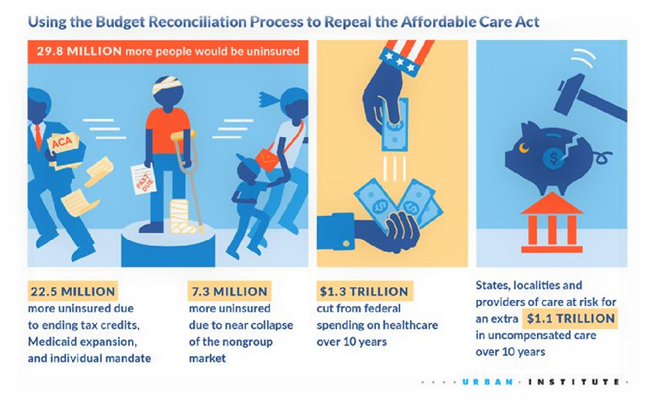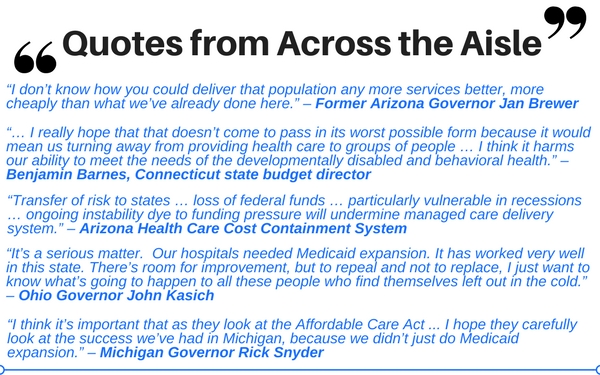This blog is part of a series to highlight the dangers of repealing the Affordable Care Act. Community Catalyst is highlighting different constituencies to draw attention to the benefits the ACA has afforded them and to outline what a loss of coverage would mean.
Thanks to the Affordable Care Act (ACA), the uninsured rate in the United States declined to 8.6 percent in the first quarter of 2016, the lowest level on record. Approximately 22 million adult Americans have gained coverage through the ACA’s insurance Marketplaces and Medicaid expansion, in those states that proceeded with it. In addition, more than 3 million children have gained coverage since the ACA’s enactment, cutting in half the rate of uninsured children. Coverage gains are strong across all racial and ethnic groups, with a decline of 6 percent in the uninsured rate among whites, 10.3 percent among African-Americans, and 11.5 percent among Hispanics.
With this large decline in the number of people who are uninsured, states have seen significant budget savings and revenue gains. Over the last six years, changes deriving from the ACA have bolstered state economies and created more jobs in the health sector. According to a recent compilation of national and state-level data released by the U.S. Department of Health and Human Services, states have experienced a $7.4 billion decrease in hospital uncompensated care costs, the unreimbursed cost of the care provided by hospitals to people who are uninsured or underinsured. States that have expanded Medicaid have seen their uncompensated care costs fall by a total of $5 billion. Conversely, states that failed to expand Medicaid lost out on an estimated $4 billion in savings. In addition, Medicaid expansion states continue to report state savings in other areas, such as in behavioral health and criminal justice.
Unfortunately, despite these undeniable achievements, President Trump and the Republican-led Congress have already begun efforts to dismantle the ACA. Through use of the budget reconciliation process, virtually all of the ACA’s coverage accomplishments (i.e., Medicaid expansion and tax credits for Marketplace coverage), and the revenue that helps fund them (i.e., the penalties associated with the individual and employer mandates), could be repealed early this year. And just a few hours after taking the oath of office at the Capitol, President Trump signed an executive order to give federal agencies the power to unwind regulations the ACA created. Up until now, the Republicans have failed to put forward a detailed replacement plan, and it could be years before they will enact a new plan. There is absolutely no doubt that eliminating the ACA’s coverage successes without a meaningful alternative approach will force millions of hard-working Americans to lose their insurance, as well as put state budgets at risk.
What states stand to lose:

States would experience a skyrocketing increase in uncompensated care spending over the next decade.
According to a new Urban Institute study, if a reconciliation bill passes, an additional 29.8 million people would be without coverage. Over 75 percent of those would become uninsured because of the elimination of Medicaid expansion, federal financial assistance for Marketplace coverage and elimination of the individual mandate, leading state and local governments as well as health care providers to experience an estimated $1.1. trillion in uncompensated care spending over the next decade.
States would lose billions of dollars in federal funding for Medicaid expansion
Although there is no consensus on a replacement plan, prior “repeal and replace” bills and proposals included elimination of Medicaid expansion. Let’s take a look at last year’s H.R. 3762, a budget reconciliation bill that was passed by both houses of Congress in 2015 but vetoed by President Obama in early 2016. This bill called for the complete elimination of Medicaid expansion for adults with incomes up to 133 percent of the federal poverty line as, well as enhanced Federal Medical Assistance Percentage (FMAP) for newly-eligible adults. According to a Manatt analysis, 31 states and Washington D.C. received an estimated $56 billion in federal funding to expand the program in calendar year 2016. Without the enhanced FMAP, the majority of expansion states would be forced to close their programs, leaving more than 11 million low-income adults without coverage. Medicaid cuts would be bad for state economies, and drastically reduce their ability to provide needed services for their most vulnerable residents (including expectant mothers, children with special health care needs and people with disabilities).

Repealing the ACA without an alternative approach would lead to state budget shortfalls as a result of a sharp reduction in federal funding. According to the Commonwealth Fund, ACA repeal would result in a $140 billion loss in federal funding for health care in 2019, leading to the loss of 2.6 million jobs across all states. Over the next 10 years, states would see a cumulative loss of $1.5 trillion in gross products and a $2.6 trillion reduction in business output.
Governors, state Medicaid directors, and state budget officers have a lot at stake if the federal government pushes major health care cost increases onto states. Now more than ever advocates should urge state policymakers to speak out loudly against the repeal of the ACA because of the damage that will be done to hard-working Americans and state economies.
